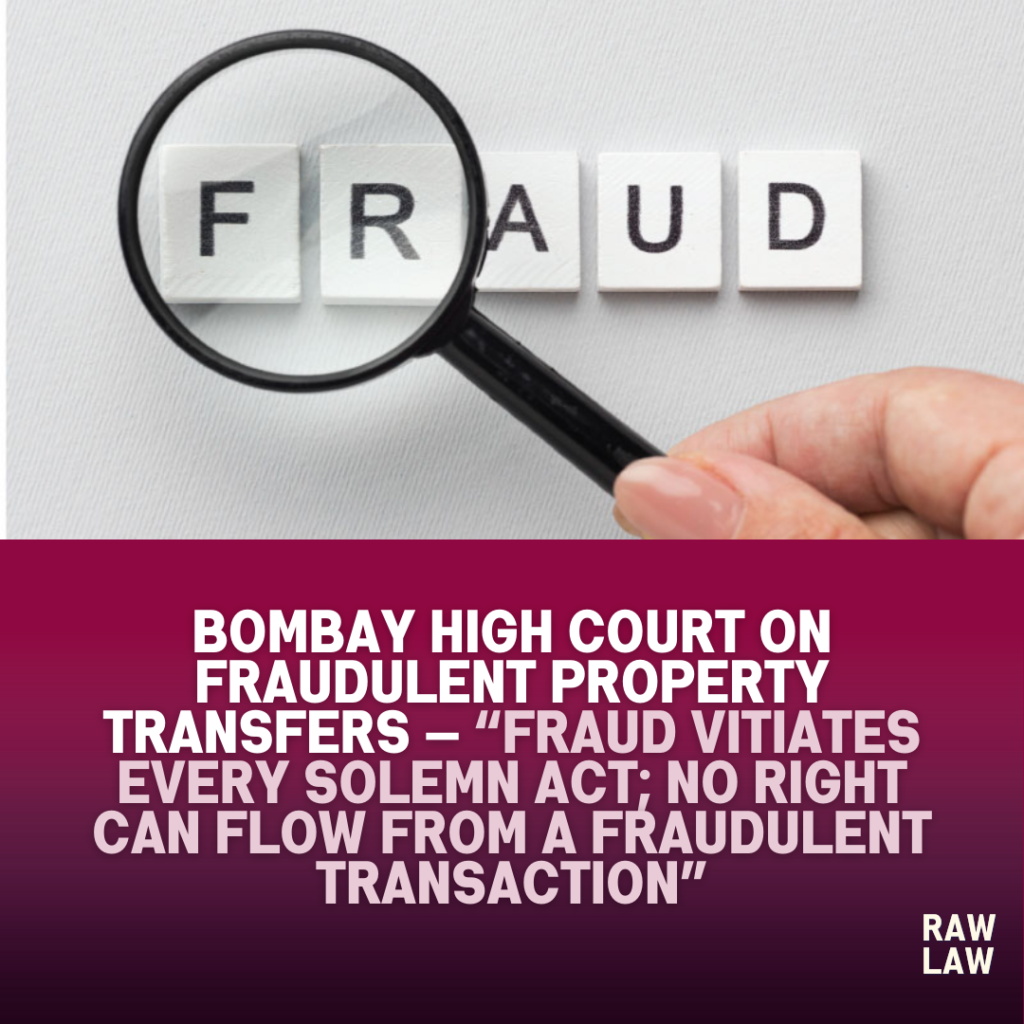Court’s Decision
The Bombay High Court held that once a transaction is demonstrated to be fraudulent, it cannot confer any legal rights upon any party, irrespective of subsequent transfers or claims. The Court emphasized that “fraud vitiates every solemn act,” thereby nullifying the sale transactions based on false representations and forged documents. The writ petition challenging the orders passed by the revenue authorities was dismissed, and the Court affirmed that no mutation entries based on fraudulent transactions could stand in law. The Court reiterated that public records cannot be manipulated to legitimize fraud.
Facts
The dispute arose from agricultural land where the petitioner claimed ownership rights through sale transactions. However, the respondents contended that the entire transaction was fraudulent since the alleged vendors had no legal right to transfer the property in the first place. The Tahsildar and the revenue authorities, upon inquiry, cancelled the mutation entries that were made on the basis of such transactions. The petitioner challenged this before the High Court, asserting that once his name was entered in the record of rights, he had acquired valid title. The respondents countered that fraud was writ large on the face of the record, and the entries could not stand.
Issues
- Whether mutation entries based on fraudulent sale transactions confer legal title.
- Whether the petitioner could claim protection on the basis of entries in the revenue record despite the fraudulent foundation of the transaction.
- Whether the revenue authorities acted within jurisdiction in cancelling the entries.
Petitioner’s Arguments
The petitioner argued that he was a bona fide purchaser for value and had acquired the property through lawful sale deeds. Once his name was mutated in the revenue record, he acquired presumptive ownership, and the authorities could not summarily cancel the entries without following due process of law. He contended that mutation entries, once effected, cannot be cancelled merely on allegations of fraud without a declaration from a competent civil court. The petitioner further argued that the principles of natural justice were violated as the cancellation order was passed in a mechanical manner.
Respondent’s Arguments
The respondents submitted that the transactions in question were tainted by fraud from inception. The alleged vendors had no authority to sell the property, and the petitioner was complicit in obtaining the entries by misrepresentation. They argued that fraud vitiates everything and no title can pass under a void and fraudulent document. The respondents contended that the revenue authorities were within their jurisdiction to cancel entries obtained by fraud since they are custodians of public records and cannot allow fraudulent transactions to pollute the revenue record. They relied on judicial precedents where fraudulent transfers were declared nullities.
Analysis of the Law
The Court examined the settled principle that mutation entries are only fiscal in nature and do not themselves create title. The Court reiterated that entries in the record of rights are only for revenue purposes and confer no ownership rights. Importantly, the Court stressed that where the underlying transaction is fraudulent, even a civil court declaration cannot validate the fraud. Fraud strikes at the root of all transactions, rendering them null and void. Thus, revenue authorities are duty-bound to correct fraudulent entries.
Precedent Analysis
The Court relied on several precedents:
- S.P. Chengalvaraya Naidu v. Jagannath (1994) – The Supreme Court held that a judgment or order obtained by fraud is a nullity and non est in the eyes of law. Fraud unravels everything.
- A.V. Papayya Sastry v. Government of A.P. (2007) – It was reiterated that a decree or order obtained by playing fraud is a nullity and can be challenged even in collateral proceedings.
- Meghmala v. G. Narasimha Reddy (2010) – The Court observed that fraud vitiates all solemn acts and no equitable principle can protect a fraudulent party.
By invoking these precedents, the High Court emphasized that fraud contaminates even statutory rights and cannot be permitted to confer legal advantages.
Court’s Reasoning
The Court reasoned that the petitioner’s claim was fundamentally flawed since the sale transaction itself was a nullity. Once fraud was established, no subsequent rights could flow. Mutation entries are not proof of title but mere fiscal records for collection of land revenue. The authorities had jurisdiction to cancel such entries when they are shown to be based on fraudulent transactions. The Court further observed that allowing fraudulent transactions to stand would defeat the sanctity of property records and encourage illegality. Thus, the petition deserved dismissal.
Conclusion
The writ petition was dismissed. The High Court upheld the cancellation of mutation entries and reiterated that no right can emanate from a fraudulent transaction. Fraud not only vitiates the transaction but also invalidates all subsequent acts flowing from it. The petitioner’s plea for protection under revenue records was rejected, and the authorities’ action was held justified.
Implications
This ruling reinforces the principle that fraud nullifies all legal proceedings and documents, including sale deeds and mutation entries. It clarifies that revenue entries do not create ownership rights and fraudulent entries can be struck down by revenue authorities themselves. The judgment is a strong warning against attempts to manipulate land records and reaffirms the duty of authorities to maintain the integrity of public registers. It also highlights the judiciary’s intolerance toward fraudulent transfers in property disputes.
FAQs
Q1. Do mutation entries in revenue records confer ownership rights?
No, mutation entries are only for fiscal purposes and do not confer title. Ownership rights can only be established through valid transactions and civil court declarations.
Q2. Can a fraudulent transaction ever confer rights if later ratified?
No, fraud vitiates everything. Even if subsequent transfers or ratifications occur, no right can flow from a fraudulent foundation.
Q3. Can revenue authorities cancel fraudulent entries without civil court intervention?
Yes, revenue authorities, being custodians of public records, have the jurisdiction to cancel fraudulent entries to protect the integrity of land records.



